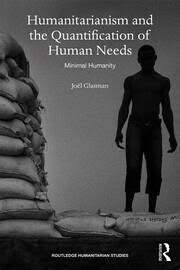Humanitarianism and the Quantification of Human Needs: Minimal Needs – Joël Glasman

Author: Joël Glasman
Publisher: Routledge
Year of Publication: 2019
Print Length: 274 pages
Genre: Non-Fiction / Anthropology, Non-Fiction / Migration & Refugee Studies
Area: Central Africa
Topic: Human Rights, Humanism, Humanitarian Action & Humanitarianism, Refugees & Forced Migration, Refugees’ Roles & Self-Reliance, Responses to Refugees, Vulnerability
This book provides the first historical inquiry into the quantification of needs in humanitarian assistance. Ultimately the book argues that we cannot understand the global humanitarian aid movement, if we do not understand how humanitarian agencies made human suffering commensurable across borders in the first place.
The book identifies four basic elements of needs: as a concept, as a system of classification and triage, as a form of material apparatus, and as a codified standard. Drawing on a range of archival sources ranging from the United Nations Refugee Agency (UNHCR), Médecins sans Frontières (MSF), and the Sphere Project, the book traces the concept of needs from their emergence in the 1960s right through to the modern day, and United Nations Secretary-General Ban Ki-moon’s call for “evidence-based humanitarianism”. Finally the book assesses how the international governmentality of needs played out in a recent humanitarian crisis, drawing on detailed ethnographic research of Central African refugees in the Cameroonian borderland in 2014-2016.
This important historical enquiry into the universal nature of human suffering will be an important read for humanitarian researchers and practitioners, as well as readers with an interest in international history and development.
Table of Contents
Acknowledgments
List of figures
List of tables
List of boxes
List of abbreviations
Introduction: Minimal humanity – the commensuration of human suffering on a global scale
1 Concepts: Elements of a genealogy of needology
2 Classifications: UNHCR and the legibility of refugees in Central Africa
3 Artifacts: Malnutrition, MUAC, and the materialization of anthropometry
4 Standards: The Sphere Project and the universalization of the vital minimum after Goma
5 Registration: Refugees and the emergence of the humanitarian field in Cameroon
6 Vulnerability: Impartial algorithms and analog malnutrition
Conclusion: Infrastructure of commensurability
Index

Joël Glasman is a Professor of African History at University of Bayreuth. He focuses on West and Central Africa in the 20th century, particularly colonialism, governmentality, humanitarianism and the production of power as framed by praxis theory and science and technology studies. His publications inquire into social classifications produced by state institutions, international governmentality and private corporations. He further engages with the theory of global history, global norms and colonialism. His last book, Les humanités humanitaires. Manuel d’autodéfense à l’usage des volontaires (2023), reflects on the practical use of the humanities. Joël’s project At gd:c, Empire of waste, looks at imperialism as a regime of waste built on material exploitation and racial inequalities. Immobilisation, hiding and destruction of waste played a crucial role in imperial domination, as indicated by recent research on toxicity, waste dumping and radioactivity in Africa.
Source: https://www.globaldisconnect.org/10/04/joel-glasman-joins-global-disconnect/
More from Joël Glasman in this library, click here.
